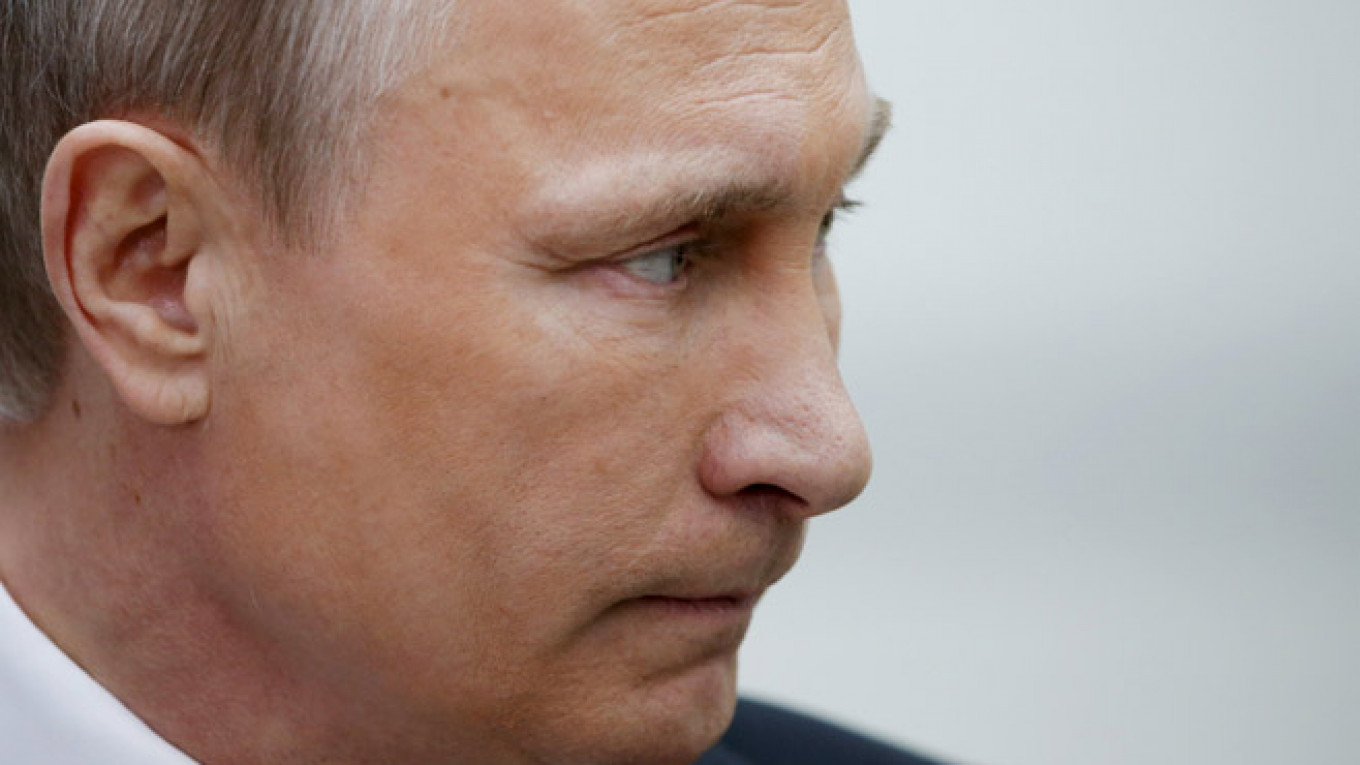The ruble slumped 4 percent and Moscow-listed stocks fell on Friday after official data showed that Russia's economy contracted sharply in the first quarter of this year.
The data, which showed a deep decline in real wages and consumer spending, came a day after President Vladimir Putin told Russians that the worst of the economic crisis was behind them, saying, "We have have passed the peak of our problems. … Nothing burst, and everything is working," according to a transcript on the Kremlin website.
But despite Putin's positivity, Russia's problems aren't over yet. Economic activity plummeted in the first three months of the year according to figures released by the Rosstat state statistics service.
Retail sales contracted by 8.7 percent in March, compared to the same month in 2014. Real wages fell 9.3 percent year-on-year. Unemployment rose by 100,000 people in March to 4.5 million, or 5.9 percent of the economically active population.
Russia's economy is under pressure from Western sanctions imposed on Moscow over its actions in Ukraine and steep falls in the price of oil, Russia's main export.
Investment slumped by 5.3 percent compared with March 2014, the Rosstat figures showed. Industrial production was down by 0.6 percent year-on-year.
According to London-based economic research company Capital Economics, the data was consistent with the Russian economy contracting 3-3.5 percent in the first quarter compared to the same period last year.
The figures drove a sell off of Russian assets. Dollar-traded shares on Moscow's RTS index closed down 5.9 percent at 998 points, while the ruble-denominated MICEX, which is buoyed by a weaker Russian currency, fell 1.8 percent to 1,657 points.
The ruble on Friday fell 4 percent against the U.S. dollar to 51.9 and 4.5 percent against the euro to 56.1.
Russian shares and the ruble had rebounded sharply since last year, when jitters over Western sanctions and the rapidly falling oil price prompted panic selling that briefly forced the ruble to 80 against the dollar. From one of the world's worst-performing currencies last year, the ruble this year became one of the best-performing.
However, the Russian currency is still one-third weaker to the dollar than at the start of 2014, before Moscow's annexation of Crimea from Ukraine prompted the West to retaliate with sanctions.
The ruble's rally had fueled optimism that Russia would weather the economic crisis better than expected. Finance Minister Anton Siluanov said last week the economy could return to growth in the second half of this year. Inflation, which had sped to its highest in 13 years as the weakening ruble raised the price of foreign goods, this month saw its first weekly fall since last summer, to 16.8 percent year-on-year.
Last Wednesday the ruble strengthened below 50 to the dollar for the first time since November last year, leading Central Bank Governor Elvira Nabiullina to suggest that Russia now had leeway to cut interest rates.
"With other things being equal and no new significant negative factors, the ruble's strengthening will allow us to cut the key rate," Elvira Nabiullina told reporters on Thursday in Washington, where finance ministers and central bankers gathered for International Monetary Fund meetings, the Bloomberg news agency reported.
"The ruble is in a more or less balanced situation," Bloomberg quoted Nabiullina as saying.
The Central Bank last year raised interest rates from 5.5 percent to 17 percent to bolster the ruble, but trimmed its benchmark rate to 14 percent this year as the currency firmed.
Officials and businesses have leaned heavily on the bank to cut rates further and faster to make borrowing affordable and stimulate investment. Russia's economy is expected to contract by up to 5 percent this year.
Timothy Ash, chief emerging markets economist at Standard Bank in London, said in a note to investors on Friday that the Central Bank would likely cut rates. The rate cut would likely prompt the ruble to fall again, he said.
"[The] ruble rally had simply run too far," he wrote. "I expect to see it now weaken back to more like 55-60 [to the dollar]."
Contact the author at p.hobson@imedia.ru
A Message from The Moscow Times:
Dear readers,
We are facing unprecedented challenges. Russia's Prosecutor General's Office has designated The Moscow Times as an "undesirable" organization, criminalizing our work and putting our staff at risk of prosecution. This follows our earlier unjust labeling as a "foreign agent."
These actions are direct attempts to silence independent journalism in Russia. The authorities claim our work "discredits the decisions of the Russian leadership." We see things differently: we strive to provide accurate, unbiased reporting on Russia.
We, the journalists of The Moscow Times, refuse to be silenced. But to continue our work, we need your help.
Your support, no matter how small, makes a world of difference. If you can, please support us monthly starting from just $2. It's quick to set up, and every contribution makes a significant impact.
By supporting The Moscow Times, you're defending open, independent journalism in the face of repression. Thank you for standing with us.
Remind me later.


